

The NEW... GLOBAL Indexes. Creeepy.... our breath is a poison and they want to reduce it to... zero? Carbon neutrality. Carbon emission trading. Carbon neutral fuel. Carbon-neutral fuels can refer to a variety of energy fuels or energy systems which have no net greenhouse gas emissions or carbon footprint.
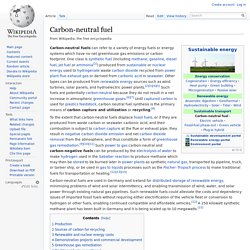
One class is synthetic fuel (including methane, gasoline, diesel fuel, jet fuel or ammonia[1]) produced from sustainable or nuclear energy used to hydrogenate waste carbon dioxide recycled from power plant flue exhaust gas or derived from carbonic acid in seawater. Other types can be produced from renewable energy sources such as wind turbines, solar panels, and hydroelectric power plants.[2][3][4][5] Such fuels are potentially carbon-neutral because they do not result in a net increase in atmospheric greenhouse gases.[6][7] Until captured carbon is used for plastics feedstock, carbon neutral fuel synthesis is the primary means of carbon capture and utilization or recycling.[8] Production[edit] Carbon-neutral fuels are synthetic hydrocarbons.
Researchers have also suggested using methane to produce dimethyl ether. The U.S. Carbon project. A carbon project refers to a business initiative that receives funding because of the cut the emission of greenhouse gases (GHGs) that will result.

To prove that the project will result in real, permanent, verifiable reductions in Greenhouse Gases, proof must be provided in the form of a project design document and activity reports validated by an approved third party in the case of Clean Development Mechanism (CDM) or Joint Implementation (JI) projects. Reasons for carbon project development[edit] Carbon projects are developed for reasons of voluntary environmental stewardship, as well as legal compliance under a Greenhouse Gas Cap & Trade program. Carbon credit. A carbon credit is a generic term for any tradable certificate or permit representing the right to emit one tonne of carbon dioxide or the mass of another greenhouse gas with a carbon dioxide equivalent (tCO2e) equivalent to one tonne of carbon dioxide.[1][2][3] Carbon credits and carbon markets are a component of national and international attempts to mitigate the growth in concentrations of greenhouse gases (GHGs).
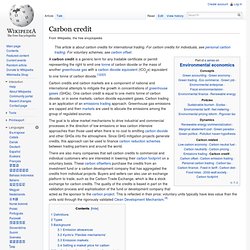
Carbon finance. Carbon finance is a new branch of Environmental finance.
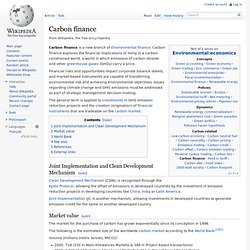
Carbon finance explores the financial implications of living in a carbon-constrained world, a world in which emissions of carbon dioxide and other greenhouse gases (GHGs) carry a price. Financial risks and opportunities impact corporate balance sheets, and market-based instruments are capable of transferring environmental risk and achieving environmental objectives. Issues regarding climate change and GHG emissions must be addressed as part of strategic management decision-making.
The general term is applied to investments in GHG emission reduction projects and the creation (origination) of financial instruments that are tradeable on the carbon market. Carbon pricing. A carbon price is the amount that must be paid (to some public authority as a tax rate, or on some emission permit exchange[clarification needed]) for the emission of 1 tonne of carbon dioxide into the atmosphere.[1] Such payments usually take the form of a carbon tax or the cost of purchasing emission allowances in a cap-and-trade system.
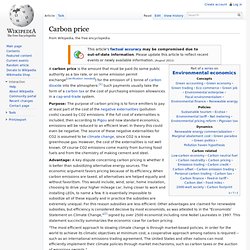
Purpose: The purpose of carbon pricing is to force emitters to pay at least part of the cost of the negative externalities (pollution costs) caused by CO2 emissions. If the full cost of externalities is included, then according to Pigou and now standard economics, emissions will be reduced to an efficient level. In theory this could even be negative. The source of these negative externalities for CO2 is assumed to be climate change, since CO2 is a know greenhouse gas. However, the cost of the externalities is not well known. Carbon-Credits System Tarnished by WikiLeaks Revelation. As the world gears up for the next round of United Nations climate-change negotiations in Durban, South Africa, in November, evidence has emerged that a cornerstone of the existing global climate agreement, the international greenhouse-gas emissions-trading system, is seriously flawed.
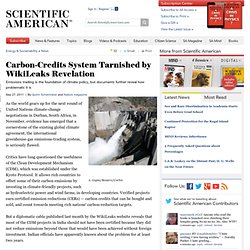
Critics have long questioned the usefulness of the Clean Development Mechanism (CDM), which was established under the Kyoto Protocol. Carbon footprint. A carbon footprint has historically been defined by Championne as "the total sets of greenhouse gas emissions caused by an organization, event, product or person.
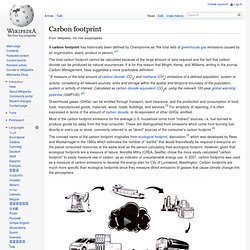
"[1] The total carbon footprint cannot be calculated because of the large amount of data required and the fact that carbon dioxide can be produced by natural occurrences. It is for this reason that Wright, Kemp, and Williams, writing in the journal Carbon Management, have suggested a more practicable definition: Carbon tax. A coal-fired power plant in Luchegorsk, Russia.
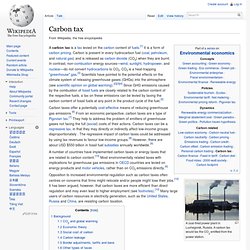
A carbon tax would tax the CO2 emitted from the power station. A carbon tax is a tax levied on the carbon content of fuels.[1] It is a form of carbon pricing. Carbon is present in every hydrocarbon fuel (coal, petroleum, and natural gas) and is released as carbon dioxide (CO 2) when they are burnt. In contrast, non-combustion energy sources—wind, sunlight, hydropower, and nuclear—do not convert hydrocarbons to CO 2.
CO 2 is a heat-trapping "greenhouse" gas.[2] Scientists have pointed to the potential effects on the climate system of releasing greenhouse gases (GHGs) into the atmosphere (see scientific opinion on global warming).[2][3][4] Since GHG emissions caused by the combustion of fossil fuels are closely related to the carbon content of the respective fuels, a tax on these emissions can be levied by taxing the carbon content of fossil fuels at any point in the product cycle of the fuel.[5] Cap, Auction, and Trade: Auctions and Revenue Recycling Under Carbon Cap and Trade.
The Global Clean Energy Race. Energy & Power. Low-carbon economy. A low-carbon economy (LCE), low-fossil-fuel economy (LFFE),[1] or decarbonised economy[2] is an economy that has a minimal output of greenhouse gas (GHG) emissions into the environment biosphere, but specifically refers to the greenhouse gas carbon dioxide.
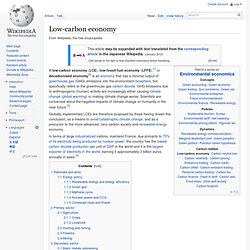
GHG emissions due to anthropogenic (human) activity are increasingly either causing climate change (global warming) or making climate change worse. Scientists are concerned about the negative impacts of climate change on humanity in the near future.[3] Globally implemented LCEs are therefore proposed by those having drawn this conclusion, as a means to avoid catastrophic climate change, and as a precursor to the more advanced, zero-carbon society and renewable energy economy. Renewable energy. Renewable energy is generally defined as energy that comes from resources which are naturally replenished on a human timescale such as sunlight, wind, rain, tides, waves and geothermal heat.[2] Renewable energy replaces conventional fuels in four distinct areas: electricity generation, hot water/space heating, motor fuels, and rural (off-grid) energy services.[3] About 16% of global final energy consumption presently comes from renewable resources, with 10% [4] of all energy from traditional biomass, mainly used for heating, and 3.4% from hydroelectricity.

New renewables (small hydro, modern biomass, wind, solar, geothermal, and biofuels) account for another 3% and are growing rapidly.[5] At the national level, at least 30 nations around the world already have renewable energy contributing more than 20% of energy supply. Renewable energy resources exist over wide geographical areas, in contrast to other energy sources, which are concentrated in a limited number of countries. Overview. Environmental finance. Environmental finance is the use of various financial instruments (usually land trusts and emissions trading) to protect the environment. The field is part of both environmental economics and the conservation movement.
The field of Environmental Finance was first defined by Richard L. Sandor, American economist and entrepreneur, when he taught the first ever Environmental Finance course at Columbia University in the fall of 1992. Dr. Gretchen Daily, of Stanford University has written a book, The New Economy of Nature that addresses the issue of financing ecosystem services. Dr. Fiscal environmentalism. Fiscal Environmentalism is a hybrid term of two traditional and often conflicting philosophies, environmentalism and fiscal conservatism, created to emphasize the growing understanding of the middle ground between the two, where the goals of each are simultaneously fulfilled.
The result is an innovative business practice based upon principles of intelligent environmental design and financial discipline, associated with each. Concept[edit] Fiscal environmentalism is a useful term for individuals who are familiar with either of the philosophies, and is related to very general concepts such as "sustainable business practices" and "socially responsible business practices", and other concepts more specific to traditional fields, such as Ecological Economics, and Environmental Management Systems.
Compared to these other terms, fiscal environmentalism emphasizes fiscal discipline. Corporate examples[edit] See also[edit] References[edit] Eco commerce. Eco commerce is a business, investment, and technology-development model that employs market-based solutions to balancing the world’s energy needs and environmental integrity. Through the use of green trading and green finance, eco-commerce allows for the further development of clean technologies such as wind power, solar power, biomass, and hydropower. EcoCommerce is an integrated ecological-economical model that provides a means to account for and value land management activities that improves the condition of natural capital and values the output of ecoservices. Green trading. Green economy.
The green economy is one that results in reducing environmental risks and ecological scarcities. Green accounting. Green accounting is a type of accounting that attempts to factor environmental costs into the financial results of operations. It has been argued that gross domestic product ignores the environment and therefore decisionmakers need a revised model that incorporates green accounting.[1] Etymology[edit] The term was first brought into common usage by economist and professor Peter Wood in the 1980s. Green politics.
Green politics is a political ideology that aims to create an ecologically sustainable society rooted in environmentalism, social justice, and grassroots democracy.[1] It began taking shape in the western world in the 1970s; since then Green parties have developed and established themselves in many countries across the globe, and have achieved some electoral success. Green paradox. The Green Paradox is a phrase coined by German economist Hans-Werner Sinn to describe the fact that an environmental policy that becomes greener with the passage of time acts like an announced expropriation for the owners of fossil fuel resources, inducing them to anticipate resource extraction and hence to accelerate global warming. Green job. A green job, also called a green-collar job is, according to the United Nations Environment Program, "work in agricultural, manufacturing, research and development (R&D), administrative, and service activities that contribute(s) substantially to preserving or restoring environmental quality.
Ecotax. Ecotax (short for Ecological taxation) refers to taxes intended to promote ecologically sustainable activities via economic incentives. Such a policy can complement or avert the need for regulatory (command and control) approaches. Often, an ecotax policy proposal may attempt to maintain overall tax revenue by proportionately reducing other taxes (e.g. taxes on human labor and renewable resources); such proposals are known as a green tax shift towards ecological taxation.
Ecotaxes are examples of Pigouvian taxes, which are taxes that attempt to make the private parties involved feel the social burden of their actions. An example might be philosopher Thomas Pogge's proposed Global Resources Dividend. Taxes affected[edit] Sustainable tourism. Tourism The term 'sustainable tourism', like 'ecotourism', is considered by many to be an oxymoron.
Tourism in general depends upon and increases air transportation, contributing significantly to greenhouse gas emissions from combustion placed high into the stratosphere where they immediately contribute to the heat trapping phenomenon behind global warming and climate change. Colonialism. Colonialism is the establishment, exploitation, maintenance, acquisition, and expansion of colonies in one territory by people from another territory.
It is a set of unequal relationships between the colonial power and the colony and often between the colonists and the indigenous population. Environmental tariff. An Environmental tariff, also known as a green tariff or eco-tariff, is an import or export tax placed on products being imported from, or also being sent to countries with substandard environmental pollution controls. They can be used as controls on global pollution and can also be considered as corrective measures against "environmental races to the bottom" and "eco-dumping".[1] Net metering. Renewable energy commercialization. Marginal abatement cost. Environment & Sustainability. Portal:Energy. Pollution haven theory.